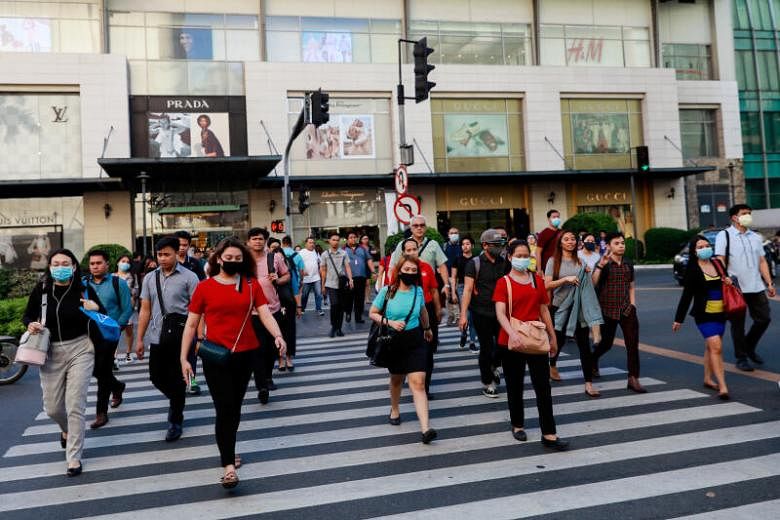MANILA - Philippine President Rodrigo Duterte on Thursday (March 12) placed Metropolitan Manila under lockdown, in a forceful attempt to stop the spread of the coronavirus.
"The crisis is very, very clear. (The virus) is spreading all throughout the country," he said after meeting an inter-agency task force dealing with the outbreak.
He said he had approved the task force's recommendation to suspend "land, domestic air and domestic sea travel to and from Metro Manila" from Sunday till April 14.
"Then we'll see if there's a slowdown in the contagion," he said.
Metro Manila spans 16 cities and one town. It is home to over 13 million.
Mr Duterte said he had been advised to refrain from using the word "lockdown" and just say the entire region was now on "community quarantine".
"But it's a lockdown," he said.
Insisting there was nothing to fear from such a measure, he said: "It has nothing to do with the power of the military or power of the police. It's just an issue of protecting public interest and public health."
This comes as the Health Ministry announced it had tallied three more cases of Covid-19, for a total of 52 confirmed cases in the country. It also announced that three more people had died in the past two days, bringing the total number of deaths to five.
The resolution signed by Mr Duterte enforcing the lockdown was scant on details.
It did not, for instance, address those working in Metro Manila but live in surrounding suburbs, or how the flow of goods and trade to the capital would be regulated.
Police have already laid out plans to deploy personnel along key roads and highways, and at airports and harbours to enforce the lockdown.
The resolution stipulated other measures. Districts where there are two or more confirmed cases of infections will be under quarantine. This could be scaled up to cover entire cities if the infections are widespread.
Private companies were instructed to enforce flexible work arrangements such as work-from-home arrangements or four-day work weeks.
Mass gatherings will be prohibited, but it was not clear what these referred to, and social distancing measures would be enforced on public transport.
Classes at all levels remain suspended till April 12.
All day, word that a lockdown would be enforced set off panic buying across Metro Manila.
Groceries and supermarkets were packed, and shoppers endured queues that lasted at least an hour.
Shelves were emptied quickly, with rubbing alcohol, hand sanitisers, disinfectants, rice, canned goods, meat products and cooking oil among those most sought after.
Earlier in the day, top officials went on self-quarantine and key government offices shut their doors as more cases of the coronavirus surfaced and unease over an undetected community spread continued to percolate.
The Senate as well as the Finance and Education ministries, the central bank, economic planning and telecommunication agencies, and parts of a compound where Mr Duterte holds office were either on lockdown or "restricted access".
The Asian Development Bank (ADB) and a government bank, both in Manila, also closed their headquarters.
All had announced that they were disinfecting their premises after learning they had visitors who tested positive for the virus or had come in contact with those infected.
Meanwhile, six Cabinet ministers, nine senators, the central bank governor, three big-city mayors and five congressmen were now under self-quarantine.
Mr Duterte's daughter, Davao Mayor Sarah Duterte-Carpio, was one of them.
The President was also tested for Covid-19 and results will be out in 48 hours.
Mr Duterte was at a road inauguration event on March 5 where he met Transportation Secretary Arthur Tugade, who had by then come into contact with someone who had the virus at another event.
The finance and public works secretaries, the central bank governor and Mr Duterte's chief of staff were also there. They are now all on self-quarantine.
"I don't know the circumstances surrounding that," Mr Panelo said in a radio interview.
Mr Panelo said Mr Duterte did not have signs of an infection, but had "opted to undergo the test to perform (his) duties as a government worker".
"This is a pre-emptive step to be sure that he's fit and healthy," he said.
He said Mr Duterte would fly to his home city of Davao on Thursday, where he would likely stay, should he opt for self-quarantine.
A congressional hearing, meanwhile, seems to have set off the flurry of self-quarantines and lockdowns at the Senate and ADB.
A 72-year-old academic - an expert witness on education reform - who tested positive for the virus was at the hearing.
Only two senators were at the hearing, but seven other senators opted to quarantine themselves.
Ms Duterte-Carpio, the Education Secretary and a congressman were at the hearing.
"This virus is no joke... Many think we are panicking but if you love your parents, grandparents, you should take this virus very seriously," said Senator Miguel Zubiri.
Senator Panfilo Lacson said: "Better safe than sorry."
The academic was also said to be present at an event at the ADB, which prompted the bank to shut its headquarters in Manila and put its staff on work-from-home arrangements.
"The safety of staff, visitors to the bank, and their families is of utmost importance to us," ADB official Deborah Stokes said in a statement. "We are providing support to the staff who interacted with the visitor."
The ADB has more than 2,600 full-time staff in Manila.
The Philippines so far has 49 confirmed cases of infection, with the spike in number happening in just the past six days.
There are close to 100 Filipinos who have also tested positive abroad, including seven who are in Singapore.












